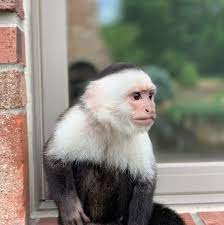Description
Capuchin Monkeys: The Clever Companions of the Primate World
Capuchin monkeys, known for their charming personalities and remarkable intelligence, have garnered widespread attention and admiration across the globe. primate paradise home
These small primates, scientifically classified under the subfamily Cebinae, are native to Central and South America. With their distinct physical characteristics and complex social behaviors, capuchins have become a focal point for both scientific research and popular culture.
This article explores the biology, habitat, behavior, and the ethical considerations surrounding the ownership of capuchin monkeys.primate paradise home
Physical Characteristics
Capuchin monkeys are easily recognizable due to their unique appearance. They typically have a cream or white face and underparts, contrasting with their dark brown or black fur on their backs and limbs.
Adult capuchins range in size from 3 to 9 pounds and can measure between 16 to 24 inches in length, with their long tails often serving as an additional limb for balance and movement through the trees.One of the defining features of capuchins is their dexterous hands, which allow them to manipulate objects with precision.
This level of dexterity is rare among non-human primates and plays a crucial role in their foraging strategies. primate paradise home
Their ability to use tools is particularly noteworthy; capuchins have been seen using stones to crack open nuts and sticks to extract insects from crevices, showcasing their cognitive capabilities.
Habitat and Distribution
Capuchin monkeys are found in a variety of habitats across Central and South America, including tropical rainforests, dry forests, and mangrove swamps. They are adaptable creatures, capable of thriving in secondary forests and areas altered by human activity.
Their range extends from Costa Rica to Brazil, where they inhabit both lowland and mountainous regions.These monkeys are primarily arboreal, spending most of their time in trees, where they forage for food.
Their diet mainly consists of fruits, seeds, flowers, and insects, although they may also consume small vertebrates. The ability to navigate the complex canopy structure of their environment is essential for their survival, as it allows them to escape predators and locate food sources.
Social Structure and Behavior
Capuchin monkeys are known for their complex social structures and behaviors. They live in troops that can consist of 10 to 35 individuals, typically led by a dominant male. Social bonds within these groups are vital, and grooming is a common behavior that helps establish and maintain relationships.
This grooming not only fosters social ties but also aids in hygiene, as it allows monkeys to remove parasites and debris from each other’s fur.Communication among capuchin monkeys is rich and diverse. They use a variety of vocalizations, facial expressions, and body language to convey messages.
Alarm calls are common when they sense danger, while contact calls help maintain group cohesion. Their social interactions are marked by playful behavior, which is essential for the development of social skills among younger monkeys.
One of the most fascinating aspects of capuchin behavior is their capacity for problem-solving and tool use. Studies have shown that capuchins can learn from observing others, demonstrating a high level of cognitive flexibility.
This ability to adapt and innovate in their foraging techniques speaks volumes about their intelligence.primate paradise home
Capuchins as Pets: Ethical Considerations
The growing popularity of capuchin monkeys as pets has raised significant ethical concerns. While their intelligence and playful nature may seem appealing, potential owners must consider the complexities involved in keeping these primates.
- Social Needs: Capuchin monkeys are highly social animals that thrive in groups. Keeping a single capuchin can lead to loneliness and behavioral issues, making it crucial for owners to provide ample social interaction, either through companionship with humans or by housing multiple monkeys together.
- Legal Regulations: The legality of owning capuchin monkeys varies widely by region. Many countries and states have imposed strict regulations or outright bans on primate ownership due to concerns about animal welfare and public safety. Prospective owners must research and comply with local laws before considering a capuchin as a pet.
- Long-Term Commitment: Capuchin monkeys can live for 25 years or more, requiring a long-term commitment similar to that of dogs or cats. Their care involves providing a proper diet, environmental enrichment, and regular veterinary care, which can be both time-consuming and costly.
- Behavioral Challenges: While capuchins are intelligent and engaging, they can also exhibit challenging behaviors. They may become aggressive if they feel threatened or if their social structure is disrupted. Owners must be prepared to invest time and effort into training and socialization.
- Welfare Concerns: The well-being of capuchin monkeys in captivity is a significant concern. Their complex needs—social, physical, and psychological—are often difficult to meet in a typical home environment. Many experts advocate against keeping capuchins as pets due to the ethical implications of removing them from their natural habitats.
Conservation Status and Future Outlook
While capuchin monkeys are not currently considered endangered, they face threats from habitat loss, deforestation, and the illegal pet trade. Conservation efforts are critical in preserving their natural habitats and ensuring their populations remain stable.
Organizations focused on wildlife conservation work to protect capuchin habitats and educate the public about the importance of respecting these intelligent primates in their natural environments.
In conclusion, capuchin monkeys are remarkable creatures that exemplify the complexity of primate behavior and intelligence. Their social nature, problem-solving abilities, and playful demeanor make them fascinating subjects of study.
However, the challenges associated with their care and the ethical considerations surrounding their ownership underscore the importance of prioritizing their welfare and conservation.primate paradise home
By understanding and respecting these incredible animals, we can ensure that capuchin monkeys continue to thrive in their natural habitats, contributing to the rich biodiversity of our planet for generations to come.






Reviews
There are no reviews yet.